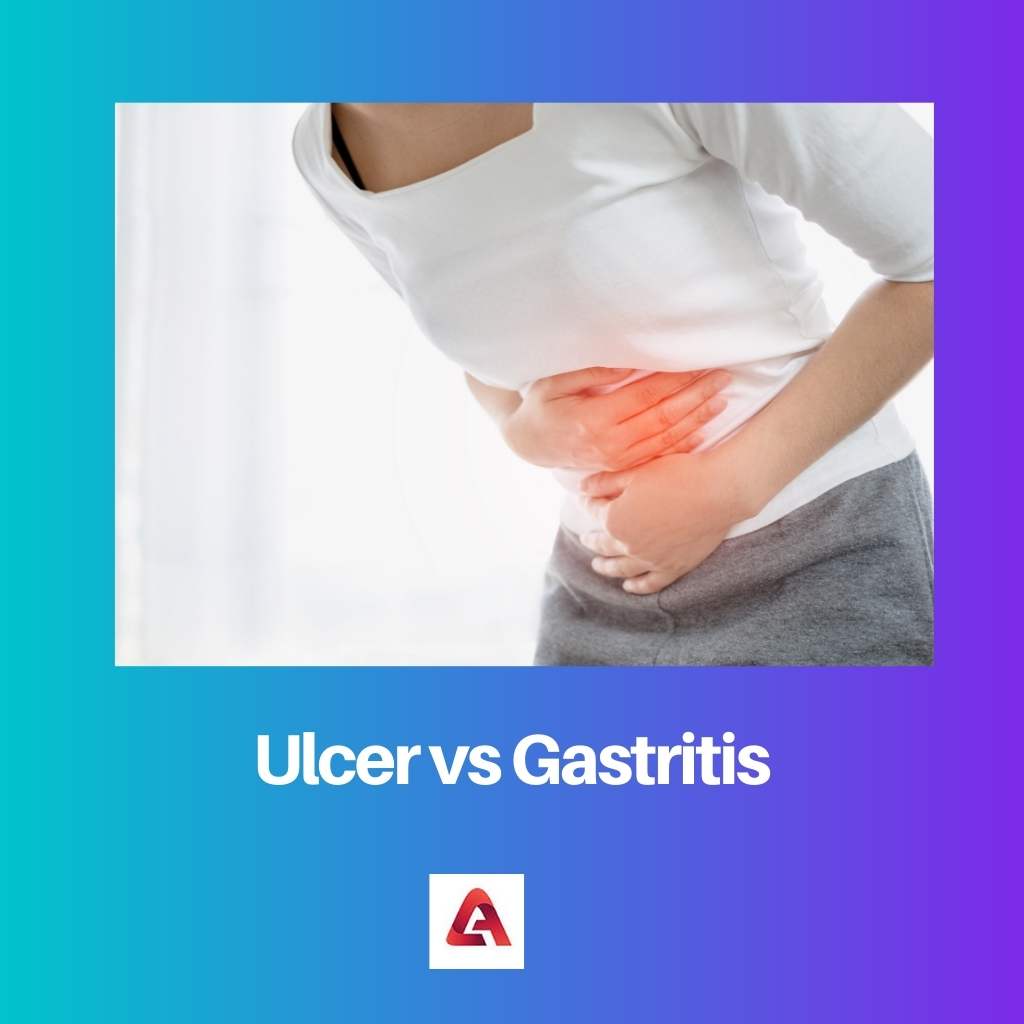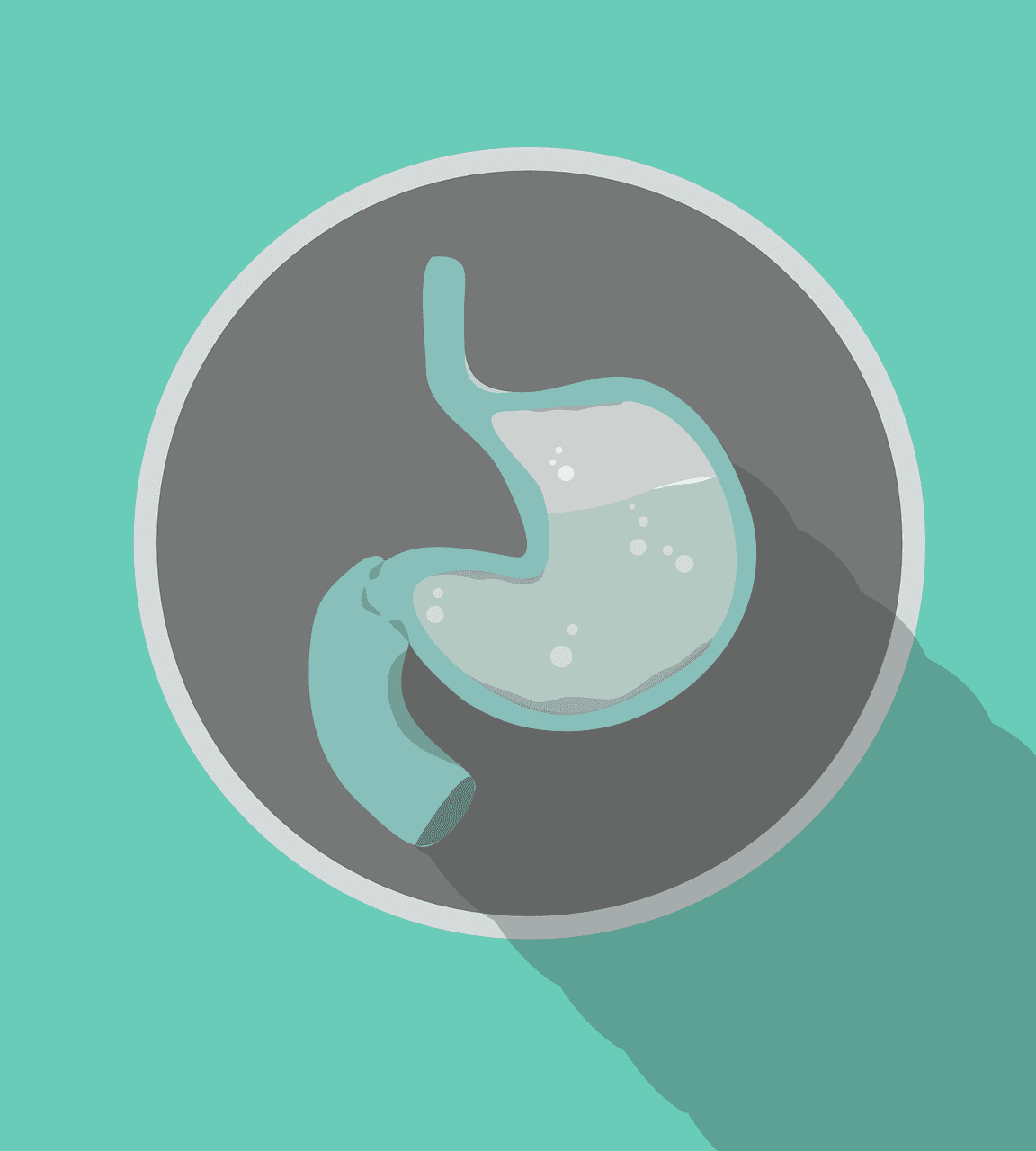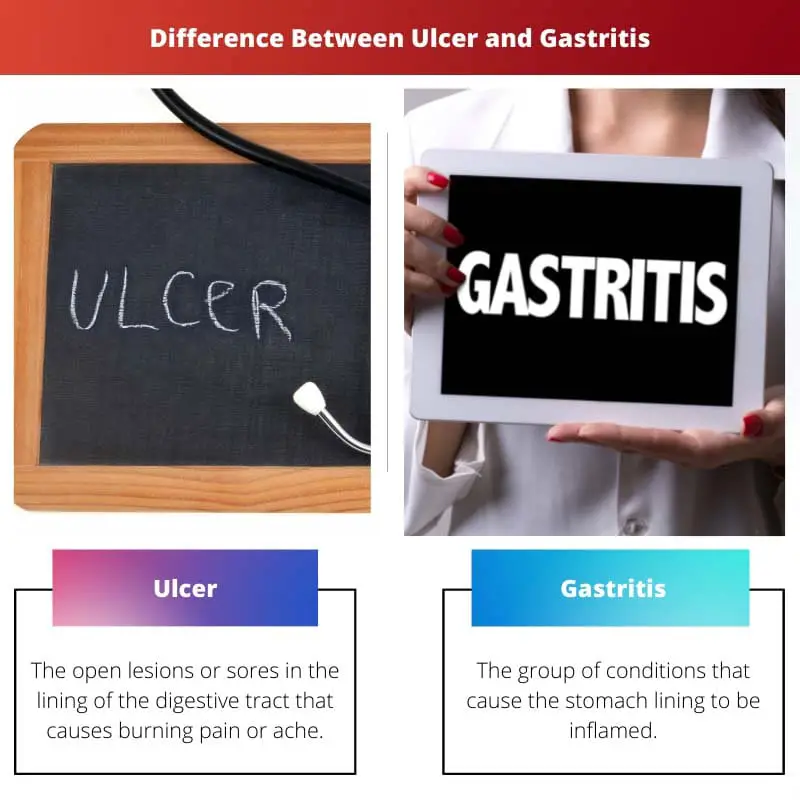Ulcer and Gastritis are conditions of the digestive tract in humans that cause pain in the abdominal region accompanied by symptoms like belching, heartburn, indigestion, nausea or vomiting, and loss of appetite.
They are both treated by the use of antacids, and if caused due to bacterial infection, then antibiotics.
Key Takeaways
- Ulcers are open sores in the stomach or small intestine lining, while gastritis is the stomach lining’s inflammation, irritation, or erosion.
- Ulcers can include sharp or burning pain, while gastritis symptoms might involve indigestion, nausea, and abdominal discomfort.
- Treatment for ulcers includes antibiotics and medications to reduce stomach acid, while gastritis treatment focuses on addressing the underlying cause and managing symptoms.
Ulcer vs Gastritis
The difference between Ulcers and Gastritis is the nature of the pain that they cause. Ulcers cause localized pain, whereas gastritis causes generalized pain. In addition to the nature of pain, the zones that may be affected in these two conditions also differ vastly.

Ulcers are sores or lesions that occur in patches on the inner mucus lining of the alimentary canal in humans, majorly the esophagus, stomach, and small intestine.
They are caused by bacterial infection, long-term intake of drugs that fall under the category of NSAIDs, and staying on an empty stomach for long periods.
Gastritis exhibits a lot more generalized inflammation on the inner mucus lining of the stomach.
Apart from bacterial infection, gastritis may result from drinking excessive amounts of alcohol, ageing, intake of painkillers, and autoimmune disorders. Sometimes gastritis is also a result of other diseases.
Comparison Table
| Parameters Of Comparison | Ulcers | Gastritis |
|---|---|---|
| Definition | The open lesions or sores in the lining of the digestive tract that causes burning pain or ache. | The group of conditions that cause the stomach lining to be inflamed. |
| Type of Inflammation. | Inflammation is localized to the specific zones where the sores have occurred. | Inflammation is generalized and occurs throughout the stomach. |
| Areas Affected | The linings of the esophagus, stomach, or small intestine may be affected. | Only the stomach lining may be affected. |
| Cause and Effect | Ulcers may be caused as a result of chronic gastritis. | Chronic gastritis may lead to ulcers. |
| Time of Resolution | Can be resolved in a few months. | Can be resolved in a few weeks. |
What is Ulcer?
Ulcers are of two types: Gastric ulcer occurring on the mucus membrane of the stomach and Duodenal ulcer occurring on the duodenal mucus membrane. The most common symptom of ulcers is abdominal pain.
Bacterial infection of Helicobacter pylori (H. pylori), prolonged ingestion of drugs like ibuprofen (Brufen, Genpril etcetera), and naproxen sodium (Naprosyn) which fall under the category of drugs called NSAIDs (nonsteroidal anti-inflammatory drugs).
Lifestyle choices like spicy food and stress may accelerate the symptoms. Digestive acids like HCl can aggravate the symptoms as they corrode the tract’s inner lining.
The pain can be alleviated for a while by eating particular kinds of food that act as a buffer to the stomach acids or by intake of medicines that are acid-reducing.
The pain might intensify between meals and at night because these are prolonged periods when the stomach goes empty.
Symptoms of Ulcers include burning stomach pain, feeling of fullness, heartburn, bloating or belching, intolerance to fatty foods, and nausea. Sometimes the patients do not suffer from any symptoms. Rarely ulcers give rise to more serious signs like:
- Bloody vomit and stool, which may appear red or black
- Trouble breathing
- Feeling faint
- Unprecedented weight loss
- Appetite changes
What is Gastritis?
Some collective conditions cause stomach lining inflammation, most commonly due to Helicobacter pylori infection.
Other direct reasons for gastritis include non-stop use of painkillers, alcohol abuse, one’s immune system damaging their own cells (autoimmune gastritis), and older age.
In addition, medical conditions like Crohn’s disease HIV/AIDS, and Sarcoidosis increase the risk of gastritis.
Injury to the mucous wall that protects the stomach makes it easier for the acidic digestive juices to damage the lining and cause inflammation. Untreated gastritis may result in bleeding and ulcers in the stomach.
Sudden onset (acute gastritis) or slow, insidious onset (chronic gastritis) are the two types of gastritis in terms of ways in which it may arise.
Gastritis is associated with symptoms like upper abdominal pain or ache that may worsen or get better with the consumption of food, feeling full in the upper abdominal area just after eating, nausea, and vomiting.
Occasionally patients do not show any signs or symptoms.
Rarely, in cases of excessive corrosion in the stomach lining, chronic gastritis increases the chances of stomach cancer. However, gastritis improves pretty quickly with proper treatment.

Main Difference Between Ulcer and Gastritis
- Ulcers are lesions or sores caused by erosion of the inner mucous lining that can occur in any zone of the digestive tract. Gastritis, on the other hand, refers to any set of conditions that cause inflammation in the mucous lining inside the stomach.
- Ulcers occur in discontinuous, restricted patches of the lining of the alimentary canal, whereas gastritis is generalized inflammation of the entirety of the stomach.
- Ulcers may occur on the mucus lining of the esophagus, stomach, or duodenum (the first part of the small intestine). Gastritis is restricted to the stomach only.
- Ulcers may result in stomach perforation. Gastritis is one of the major causes of ulcers.
- Ulcers may take about a month or two to cure. Gastritis, in general, takes a lot less time to heal. However, in the case of chronic gastritis, the process is prolonged. Anywhere from a few weeks to a few years.


I disagree with the timing for healing gastritis, it is not always that quick.
Ulcers causing a month or two to heal seems like quite a long time. Disappointed by this answer.
I agree with you, Elliot. More emphasis should have been given to the duration of ulcers’ healing.
I think the details were quite on point, and the duration of healing is understandable.
This article is simply misleading about the duration of healing ulcers and gastritis. The time for healing is not always definite.
I agree, but the information is still useful, we just have to keep in mind that healing time varies.
I expected more accurate details from this article, disappointed by this.
This detailed comparison has widened my knowledge on ulcers and gastritis, very helpful article.
Agreed, this was quite beneficial to read.
The details of the causes for ulcers and gastritis are very helpful, thank you for the information!
Yes, this is quite informative. I have ulcer and needed to know how it can be resolved.
This was a very useful comparison table. The differences between ulcers and gastritis are well-explained.